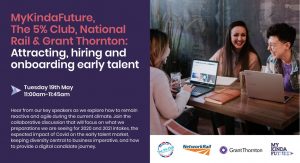MyKindaFuture, Grant Thornton and The 5% Club recently hosted an online event around how to remain reactive and agile during the current period of uncertainty, whilst allowing for attracting, hiring and on-boarding the best, most diverse early talent.
If you would like to view this event – please visit the ‘on demand replay’ section on our events page:
Here are the key points from this event we need to consider as we move forward:
- Simon Reichwald, Strategic Lead for Talent, MyKindaFuture
- Katie Nightingale, People Consulting Manager, Grant Thornton
- Chris Shirley, Apprentice Services Manager, Network Rail

The Three Catalysts
There are three key areas that could lead to a crippling impact on UK businesses:
An Ageing Workforce
32% of our workforce is now over the age of 50. Over the past few months, over 50% of the workforce has been furloughed or is working from home.
During this time, many of us have perhaps reconsidered what’s important. Therefore, there’s a risk that those who could retire but are currently working, may now decide that the time is right to take that retirement. If many people now choose to retire, this could lead to a significant amount of skill and experience leaving organisations in a short period of time. In short, the ageing workforce was creeping up on us before, but now it is an increasingly pressing issue.
Future Skills
Recruitment is slowing, being paused or has stopped completely. For example, the latest research from the ISE shows the percentage of graduate hires for 2020 has reduced by 12%, apprentices by 32%, and interns and placements by 40%.
Historically, early careers feeds the talent pipeline across many industries, and it’s one of the key strategic reasons for having an Early Talent Strategy. They maintain the flow of the level of talent as other workers retire. Consequently, if the flow of retirement and leavers is higher than the numbers of entry level talent, the skills gap widens, and the gap for those critical future skills will grow even greater.
Sadly, the current evidence shows that apprenticeship and graduate programmes will experience lower recruitment numbers. For those continuing their efforts, it will be delayed, which will result in a slowing down of the talent pool.
Subsequently, if we see more skills and experience leaving businesses, recruitment may become focused at a higher skill level than previously. Reducing the pain now through Covid-19 would risk making the skills gaps even larger later on, so balance is key.
Brexit
The final part of the perfect storm is the ever-present Brexit. Firstly, we’re seeing the impact of COVID-19 on the ability to recruit seasonal workers to pick the UK harvest. Secondly, as Brexit approaches, the current salary threshold is £30,000 for migrant workers. However, this has been countered by the Migration Advisory Committee, who recommended lowering it to £25,600.
Considering the impact of the migration controls, along with a general reduction in travel for work, the future doesn’t look too bright.
All of these factors together will mean we see:
– a significant increase in retirement rates
– decrease in early career opportunities
– reduction in availability of non-UK labour
As a result, we are likely to see a more severe skills shortage than previously anticipated, and poorer productivity. Certainly, the impact of the pandemic will be felt for some time to come. So what are the key questions to ask yourself as we restart the economy?
- Is your workforce at risk of a significant rise in retirement rates or loss of expertise?
- Will your recruitment systems work without face-face interaction?
- How robust is your early careers system and provision?
- Are the right skills being developed at entry level within the UK?
- How will you support & develop apprentices, graduates and new starters with a remote working model?
With so many changes to be made, it’s those who can respond quickest who will succeed.





